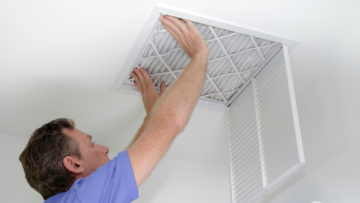When choosing an air conditioner as a homeowner, you need to be aware of the type of filters and maintenance that will be required to keep your unit running smoothly. Whether or not this comes to your mind, it is essential to understand what the MERV rating is and what it means to you as a homeowner.
What is MERV AC Filter Ratings?
In the simplest possible terms, MERV calculates how much stuff passes through an air filter. MERV stands for Minimum Effectiveness Reporting Value. The MERV rankings vary from one to twenty, it depends on the specific size of the actual particles that a filter should catch:
- An AC filter having a MERV rating of one to four can catch particles that are larger than 10 micrometers. This includes dust mites and home debris. Most window air conditioning units fall within this range.
- An AC filter having a MERV rating of five to eight can catch particles that are larger than three micrometers. These types of particles include pet dander, mold, and aerosol sprays. This is the baseline for permanently setting up residential air conditioners.
- A filter having a MERV rating of nine to ten can catch particles that are bigger than one micrometer. This mostly includes dust as well as common pollutants. Hospital labs and superior residential ac units fall within this range.
- Any filter with a MERV rating of thirteen to sixteen can capture particles that are bigger than 0.3 micrometers. This includes germs, droplets from sneezing, smoke, and most other sources of air pollution. This type of filter is utilized for the patient and surgical treatment areas of hospitals.
- A filter with a MERV rating of seventeen to twenty can capture almost all particle sizes. This includes viruses and also the finest particles of smoke, dust, and other household debris. This particular type of filter is used explicitly in clean-rooms for your manufacture of electronics or even scientific experiments.
What Level of Filtration is Needed?
As explained above, the range between five and twelve for permanently installed residential air conditioners is quite significant. If your family is prone to allergies or other health conditions, then it may be wiser to choose a higher MERV rating. In this case, you will need a filter able to remove allergens and an HVAC expert to determine the right filtration level to help allergies and suit your system. However, keep in mind, if you do not change your filters often, then using a higher-grade filter can cause wear on your unit’s motor.
Keep in mind; contemporary construction might also trigger the need for more in-depth filtration. This is because improved insulation and airtight infrastructure limit the flow of air. Although it reduces leaks and thus utility bills, it also means that fresh air outside will not be coming into the house, and indoor pollutants through cooking, cleaning, and other causes can build up. The air conditioning filter can be the only ventilation system in the home, and in this case, a higher-class filter is likely to be required. We do also offer Air Purifier products such as the REME-HALO LED and REME Halo to keep your air clean and 99% free of certain pollutants.
Don’t Forget to Look for The MERV Rating Air Filter Of Your Choice
As we mentioned earlier in this article, MERV stands for Minimum Efficiency Revealing Value; it is a value that allows us to measure the size of particles that an air filter is built to catch. Higher MERV ratings are the best for smaller particles to be captured. That’s why hospitals often use MERV 16 or above, to capture the most pollutants. When shopping at your local hardware store, the MERV ratings are typically between 5-10, make sure to look at the package label to find the MERV rating.
Although the overall efficiency of lower MERV filters is less, the filter allows more air, which can help the HVAC system functioning. To meet your home requirements and the system, it is necessary to have an acceptable mix of air filter, MERV ratings, and changing them at least 4 times per year.
The American Society of Heating, Refrigerating, and Air-conditioning Engineers (ASHRAE) came up with the MERV rating and advises filter systems with a minimum MERV rating of 6. At POLAIR, we recommend a MERV 8 filter. If you consistently change your filters at least 4 times per year, we recommend a MERV 10 filter for your home. At POLAIR, we offer a Genius Filter Replacement Program that includes 4 filter changes per year and MERV 10 filters. We will take care of all the dirty work for you and keep your home’s air clean. If you choose a Smart or Brilliant plan you will have MERV 8 filter changes 2 and 3 times, respectively. However, if you decide to pair a Filter Replacement Program with one of our SmartPM’s, then you will get a bonus upgrade to the MERV 10 filter because you will be meeting the minimum requirement of 4 changes per year.
The perfect MERV rating on the appropriate filter can significantly influence your indoor air quality, the health of your family, and your lifestyle. This makes it essential to choose the right air filter, and we can help you do that.
Call POLAIR at 561-395-6400 to purchase a SmartPM plan that includes complimentary filter replacements.
About POLAIR
At POLAIR, we offer our customers evidence-based service for their HVAC system. We invest in the best in class technology and equipment to give customers insight and service on their HVAC system that will protect not only their investment but also the longevity of their system. We are happy to provide high-quality service with our expertly trained staff.

